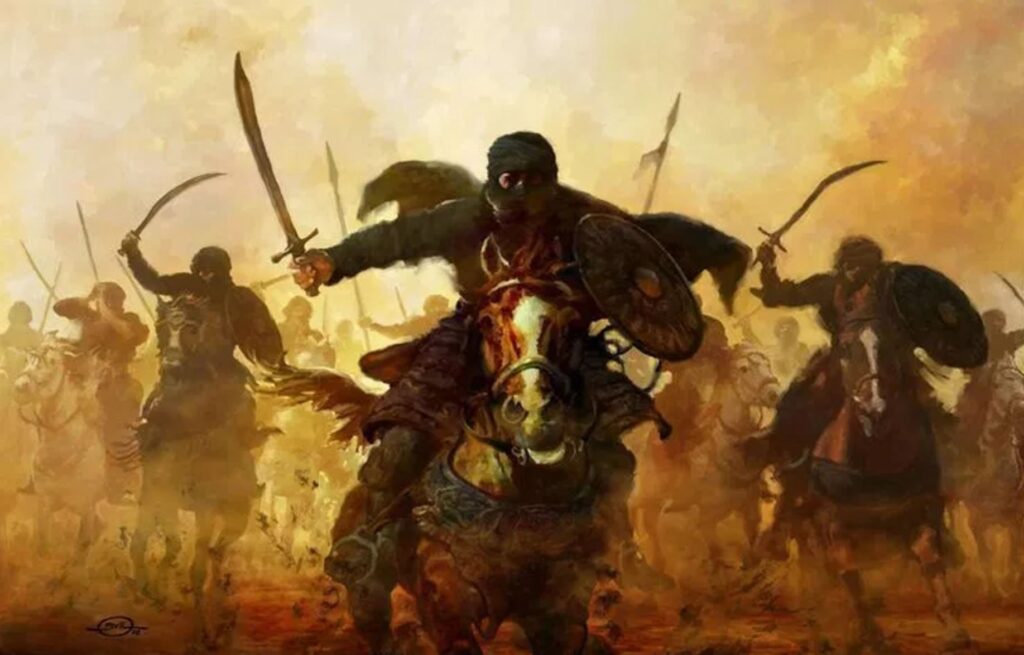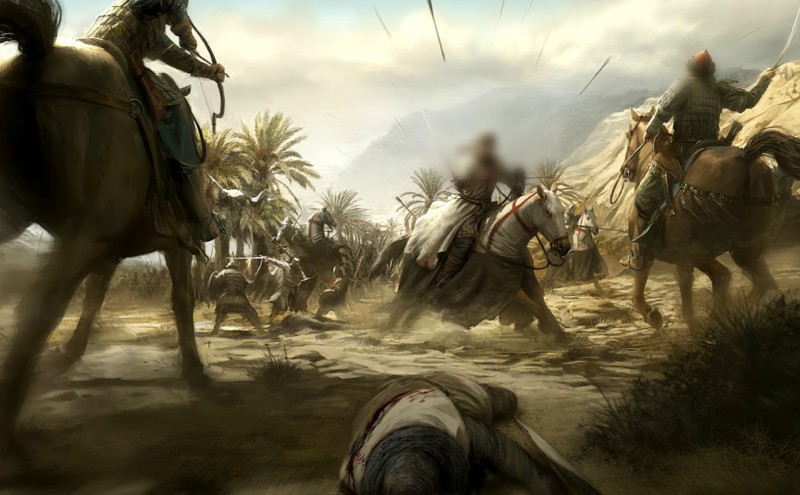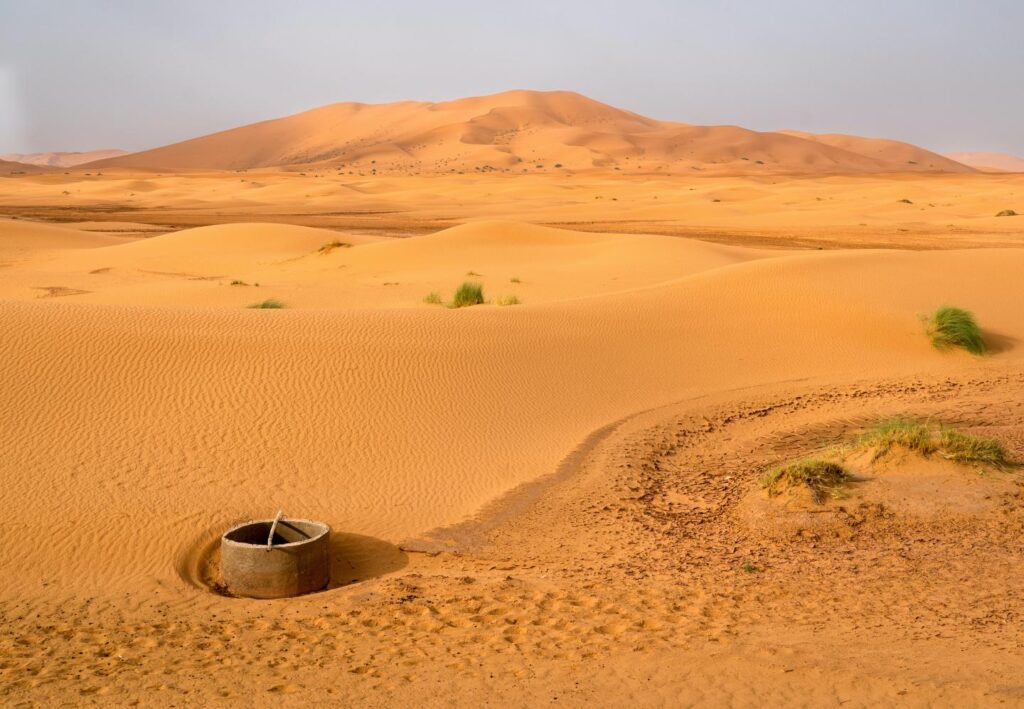
THE BATTLE OF UHUD
The reason for this battle was that Quraysh wanted to avenge their tribesmen who were
killed in the battle of Badr.
It was in the middle of Shawwal, 3 A.H. near mount Uhud, which were few kilometers to the north of Madinah. The Muslim force was 700 men, two horses, and 100 suits of armor.
50 men of the Muslim army were archers. Quraysh force was 3000 men, 200 horses, and 700 suits of armor.
In the beginning the polytheists had suffered an obvious rout. The ignominious retreat of the enemy troops and their women accompanying them taking to their heels made the archers certain of their victory. Uttering shouts of glee, they deserted their posts to despoil the enemy camp. That was the main reason for the Muslim’s defeat, causing them to loose 70 men, where Quraysh lost 22 only.
MORE PRECIOUS THAN THEIR OWN LIVES AFTER THE BATTLE OF UHUD

In the third year after Hijrah, the tribes of ‘Adal and Qara sent an embassador to the Prophet (r) asking for scholars who could be sent to teach them the rudiments of faith.
The Prophet (r) sent six of his companions who included ‘Asim b. Thabith, Khubayb b. ‘Adiy and
Zayd b. Dathinna. When this party reached Ar-Raji,a place between ‘Usfan and Makkah, the two tribes treacherously fell on them. The Muslims took out their swords to fight against them but the assailants swore by God that they would not kill them.
Three of the six Muslims replied that they could not accept any undertaking given by the pagans; so they fought and were killed.
The remaining three, Zayd, Khubayb and ‘Abdullah b. Tariq surrendered.
The last companion temporarily escaped during the return trip, but was later killed by one of the polytheists, while the remaining two were sold to the Quraysh. Hujayr b. Abu Ihab bought Khubayb to vindicate his father Ihab and Zayd was purchased by Safawan b. Umayya to avenge the loss of Umayya b. Khalaf.
When Zayd was taken out for execution, a number of the Quraysh including Abu Sufyan gathered to witness the barbaric spectacle. Abu Sufyan asked Zayd,
“Verily, for God’s sake, O Zayd, don’t you wish that Muhammed had now been in your place and you with your family?”
“By God,” replied Zayd,
“I don’t wish Muhammed to be hurt even by a thorn while I should be in sweet repose with my family.”
Thereupon Abu Sufyan remarked:
“I have never seen any man so much adored as Muhammed is held by his companions.”
Zayd was killed after that. (Ibn Hisham Vol. II, pp. 169-76, Al-Bukhaari, Kitab Ul-Maghazi).
Then they brought Khubayb to crucify him.
He asked his executioners to allow him to offer two rak’ats of prayer. Having performed the prayers in complete tranquility, Khubayb said to them,
“Were it not that you would think I only extended my prayer out of fear of death, I would have prolonged my prayer.”
Then he recited these verses:
“I fear not which side I fall apart; It’s all for God who will bless the limbs that had taken part.”
Khubayb was striken dead with the song of love on his lips.
BI’R MA’UNA

Another act of treachery took place shortly thereafter. A tribal chief, ‘Amir b. Malik, was interested to have the doctrines of Islam explained to his people.
The Prophet (r) sent 70 persons, some of whom were his eminent companions, but when they reached the place called Bi’r Ma’una, the tribesmen of Banu Sulayman, Usayya, Ri’l and Dhakwan ambushed the delegation.
The Muslims fought bravely and all but one was killed. K’ab b. Zayd returned to tell the story. He died in the Battle of the Trenches.
DYING DECLARATION OF A MARTYR

One of the Muslims who was killed treacherously on this occasion was Haram b. Milhan. The words uttered by him at the time of his death brought about the conversion of his killer Jabbar b. Salma to Islam.
Jabbar used to relate later on that what led him to accept Islam was that he attacked a man with his spear and when the man saw the tip of his spear coming out if his chest, he heard him crying, “By the Lord of Ka’bah, I have succeeded!”
Jabbar further says that he wondered what sort of success it was. Had he not killed the man? Jabbar enquired from others who told him that the man had meant martyrdom and thus he was convinced that his victim had truly been successful.
EXPULSION OF BANU AN-NADIR
The Prophet (r) approached Banu an-Nadir to demand a contribution to be paid as blood money to Bani ‘Amir since two men had been killed inadvertently by the lone survivor of Bi’r
Man’ua. Banu An-Nadir,
being one of the two influential tribes of the Jews that settled in Madinah was in alliance with Bani ‘Amir and was thus liable to pay such.
They feigned willingness to accept the demand with pleasure, but busied themselves plotting against theProphet (r). While the Prophet (r) was asked to make himself comfortable by the side of a wall in one of their houses, they counseled one another, saying;
“Never would we get such a golden chance. If one of us drops a rock on him from the top of the house, we shall all get rid of him.”
Abu Bakr, ‘Ali and ‘Umar and a few more companions were with the Prophet (r) on this occasion.
God informed the Prophet (r) of the treacherous plan of the Jews. He went back to Madinah and ordered to make preparations for war against the Banu an-Nadir. Thus, the Prophet (r) came upon them in Rabi’ul-Awwal, 4 A.H. the siege of Banu an-Nadir lasted for six nights whilst God cast terror in the hearts of the Jews.
They requested the Prophet (r) that if he agreed to spare their lives, they would abandon the city with their belongings except their war implements. The offer was accepted and Banu an-Nadir departed from Madina after destroying their houses and loading all that they could on their camels.
The chapter of the Qur’an entitled al-Hashr (Exile) in the Qur’an calls attention to the banishment of Banuan-Nadir.
“He it is Who hath cause those of the People of the Scripture who disbelieved to go forth from their homes unto the first exile. Ye deemed not that they would go forth, while they deemed that their strongholds would protect them from Allah. But Allah reached them from a place whereof they reckoned not and cast terror in their hearts so that they ruined their house with their own hands and the hands of the believers. So learn a lesson. O ye who have eyes!” [Qur’an 59:2]
Many of these exiles settled in Khaybar, the Jewish centre in the north of Hijaz, whereas others went away to the far-off Syria.
And the Muslims got rid of that sneaky dark corner of deception in their midst without having to meet the Jews in an open fight. The lands and groves left by the Jews were divided up among the first Makkahn emigrants
THE EXCURSION OF DHAT-UR-RIQ’A
In the fourth year of the Hijrah, the Prophet of God (r) decided to make an excursion into
Najd.
Together with six companions that included Abu Musa al-Ash’ari, he took refuge from an oasis in that area.
The group had to cover the distance mostly on foot, as only one camel was at their service.
The incursion was called Dhat-ur-Riq’a as the companions taking part in the expedition had to bandage their injured feet and toes. (Al-Bukhaari, Chap. Expedition of Dhat’ur-Riq’a).
The Prophet (r)’s party approached the enemy, but there was no fighting for each feared
the other. The Prophet (r) led the prayer of fear in this expedition.
WHO CAN NOW SAVE YOU?
While the Prophet (r) was on his way back to Medinah, he stopped and leaned back to take rest under the shade of a thicket of acacia trees after hanging his sword to a branch.
Jabir relates that he was taking a nap along with his friends when they heard the Prophet
(r) calling them.
They saw a Bedouin sitting by the side of the Prophet (r) and when they went to him,
he said, “I was sleeping when this man came and took hold of my sword. As I
woke-up, I saw him with the sword drawn over my head and he was asking me,
‘Who can now save you from me?’ I replied ‘Allah.
‘ Now he is sitting before you. The Prophet (r) did not, however, punish the Bedouin.
(Al-Bukhaari, Chap. Expedition of Dhatur-Riq’a)
EXPEDITION WITHOUT FIGHTING
The same year, in Sh’aban, the Prophet (r) went forth to Badr to keep his appointment with Abu Sufyan at Uhud.
He remained at Badr for eight days with a large force waiting arrival of the Makkan army.
Abu Sufyan did come out of Makkah to honor his call, but he did not venture to advance more than a few miles in the desert.
He pursuaded his men to return since it was a season of drought in which his people were in a bad shape.
There was thus no fighting and the Muslims returned with their prestige and morale bolstered higher than before.
The Prophet (r) undertook another expedition of Dumatul-Jandal a few months later. But
the Muslims returned to Madinah once more without any fighting.
for prophets stories visit https://sunofislam.com/prophetsofgod/
for scientific miracles articles visit www.sunofislam.com
